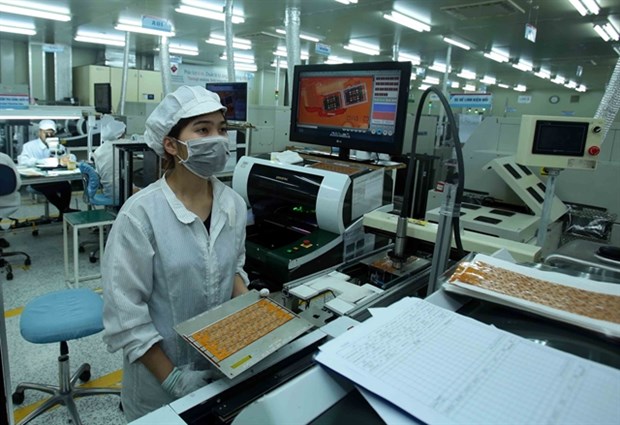Viet Nam's electronics industry continues to grow despite COVID-19
Viet Nam’s electronics industry, an increasingly important sector of the country’s economy, continues to grow despite the negative impact of the COVID-19 pandemic, according to the Ministry of Industry and Trade (MoIT).
 |
| Electronics components being manufactured at 4P Limited Co in the northern province of Hung Yen (Photo: VNA) |
Amid the pandemic, the sector brought home 77.58 billion USD over the past nine months of 2021, statistics from the General Department of Customs showed.
Of this, the export of handsets and components contributed 41.02 billion USD, up 11.5 percent year-on-year. Among major export markets were China with a turnover of 9.8 billion USD, up 52 percent, the US with a value of 7.09 billion USD, up 1.1 percent and the EU with 5.56 billion USD, down 18 percent.
Meanwhile, the export value of electronics, computers and components topped 36.56 billion USD, surging 13.6 percent over the same period of last year with 9.3 billion USD from exports to the US, up 26.5 percent; 7.8 billion USD from China, down 6.2 percent and 4.63 billion USD from the EU, up 7 percent.
As these positive nine-month figures show, the electronics industry was well on track to earn the country between 97 billion USD and 100 billion USD by the end of this year, compared to a turnover of 91.98 billion USD in 2020, Do Thi Thuy Huong, Executive Board Member of Vietnam Electronics Industries Association (VEIA) told Viet Nam News.
Huong said the electronics industry posted the highest import-export turnover in the past 10 years. It also took the lead in export turnover among processing and manufacturing industries and accounts for 30-40 percent of national GDP in the period.
Despite the challenges brought by the COVID-19 pandemic, the industry still showed positive signs over the nine-month period, Huong said.
She attributed the industry's export turnover growth in the period to an increase in demand for communication products used for distance working and learning such as mobile phones, computers, TVs and devices.
A number of companies that produced computer and electronics products in other countries were forced to close down due to the impacts of the virus. That led to local manufacturers winning more contracts, she said.
However, it could not be denied that the fourth wave of COVID-19 had impacted electronics companies, especially those in the south and two northern provinces of Bac Giang and Bac Ninh, Huong told Viet Nam News.
She said her association would continue to support electronics enterprises in both ensuring COVID-19 prevention and resuming their business operation.
Earlier in August, electronics businesses had sent eight recommendations to Prime Minister Pham Minh Chinh. They emphasised the importance of vaccinating employees of electronics enterprises as soon as possible.
Businesses petitioned the State to allow them to proactively draw up solutions to ensure safe production during the pandemic and then register to these solutions with local authorities, instead of rigidly applying "three-on-the-spot" and “one road two places” models.
They also suggested the Government direct local governments and health departments to unify medical guidelines on pandemic prevention. That would help promptly separate F0 cases from businesses so that they could continue their production activities.
Meanwhile, the firms also petitioned a 50 percent reduction for all types of tax such as value-added tax, corporate income tax, import tax and personal income for employees, and a tax payment extension of between six to 12 months.
It has also been suggested that land rental fees, a burden on businesses, be slashed by 50 percent with the payment period extended by 12 months.
In its report, Fitch Solutions predicted that Vietnam’s consumer electronics industry would accelerate in 2021 on the back of a recovery in consumer sentiment that occurs with the rollout of COVID-19 vaccines.
The industry will continue to grow through a combination of purchasing power and demographic and economic modernisation that gave Vietnam a strong regional outlook, with vendors set to tap into an expanding middle class and flow of first-time buyers.
Source: VNA